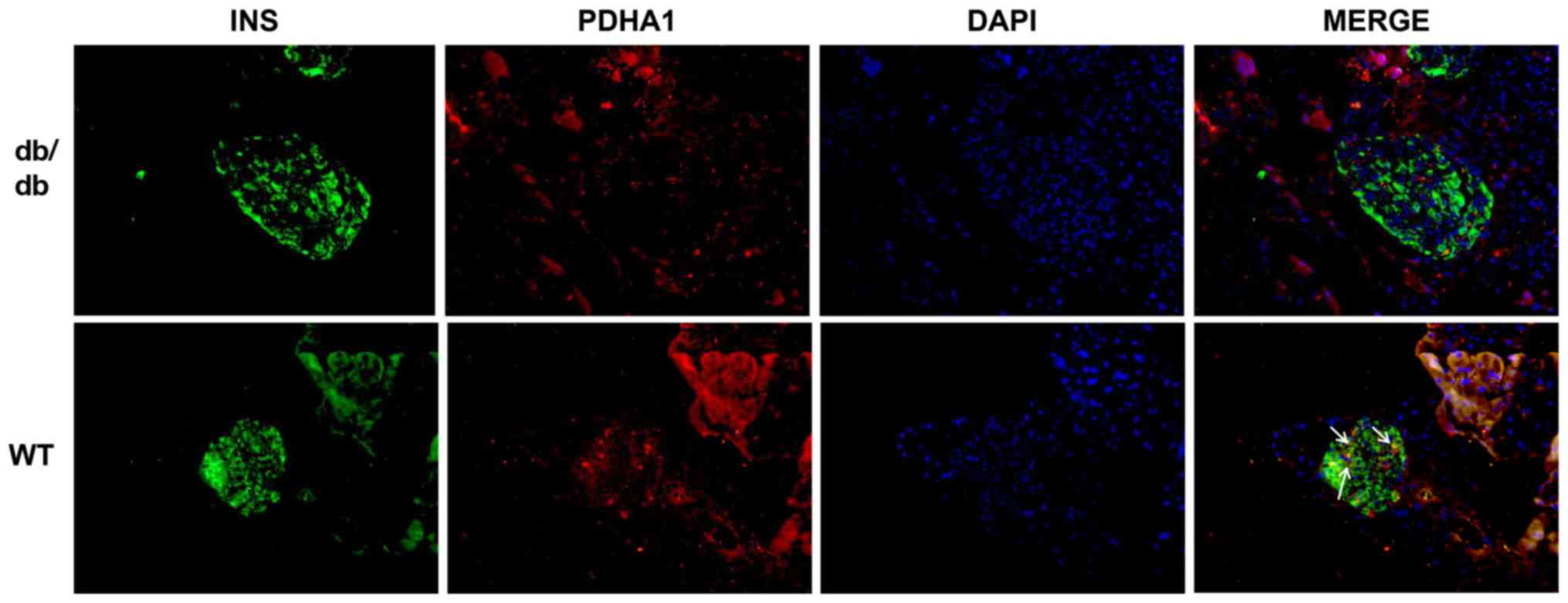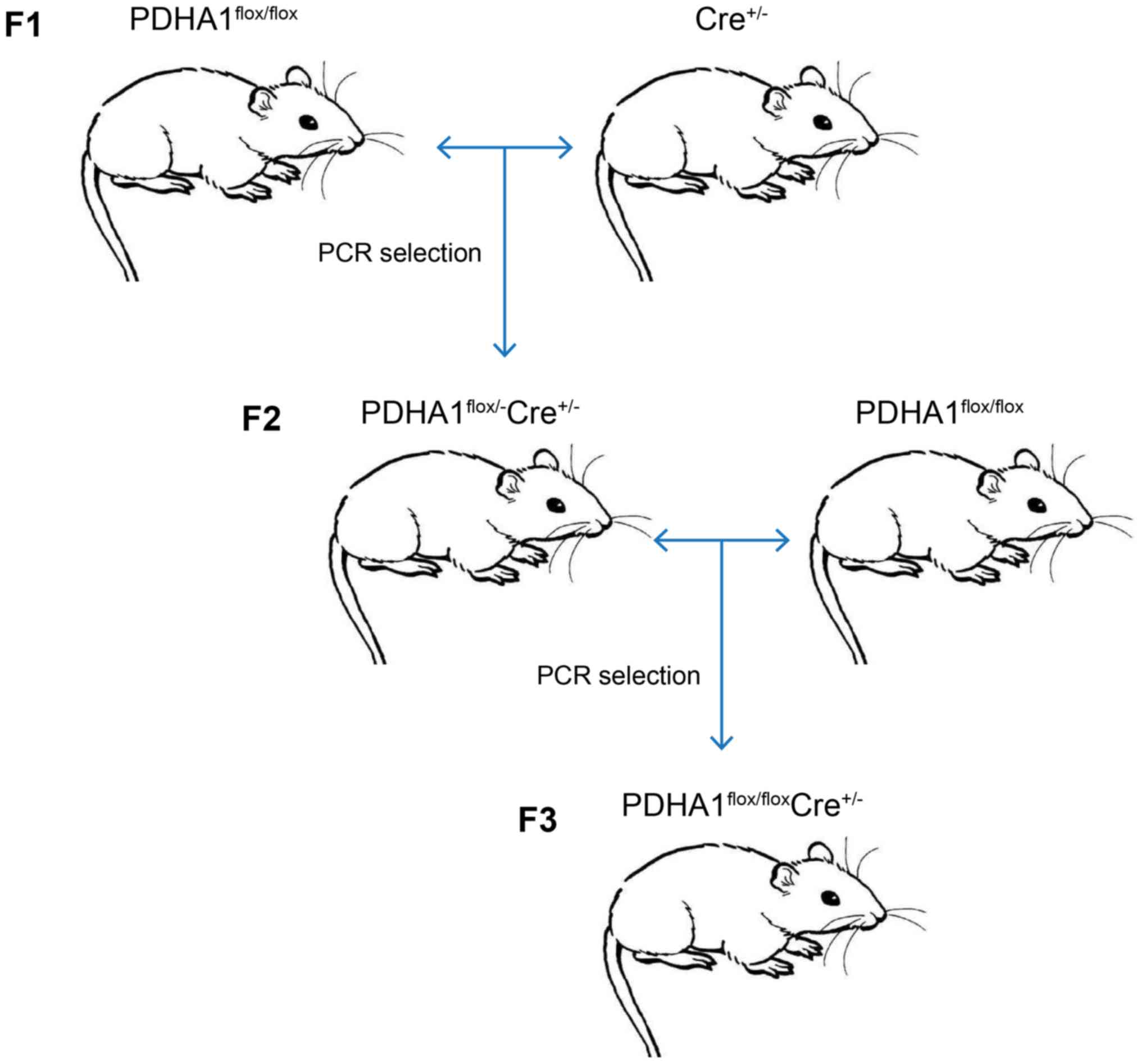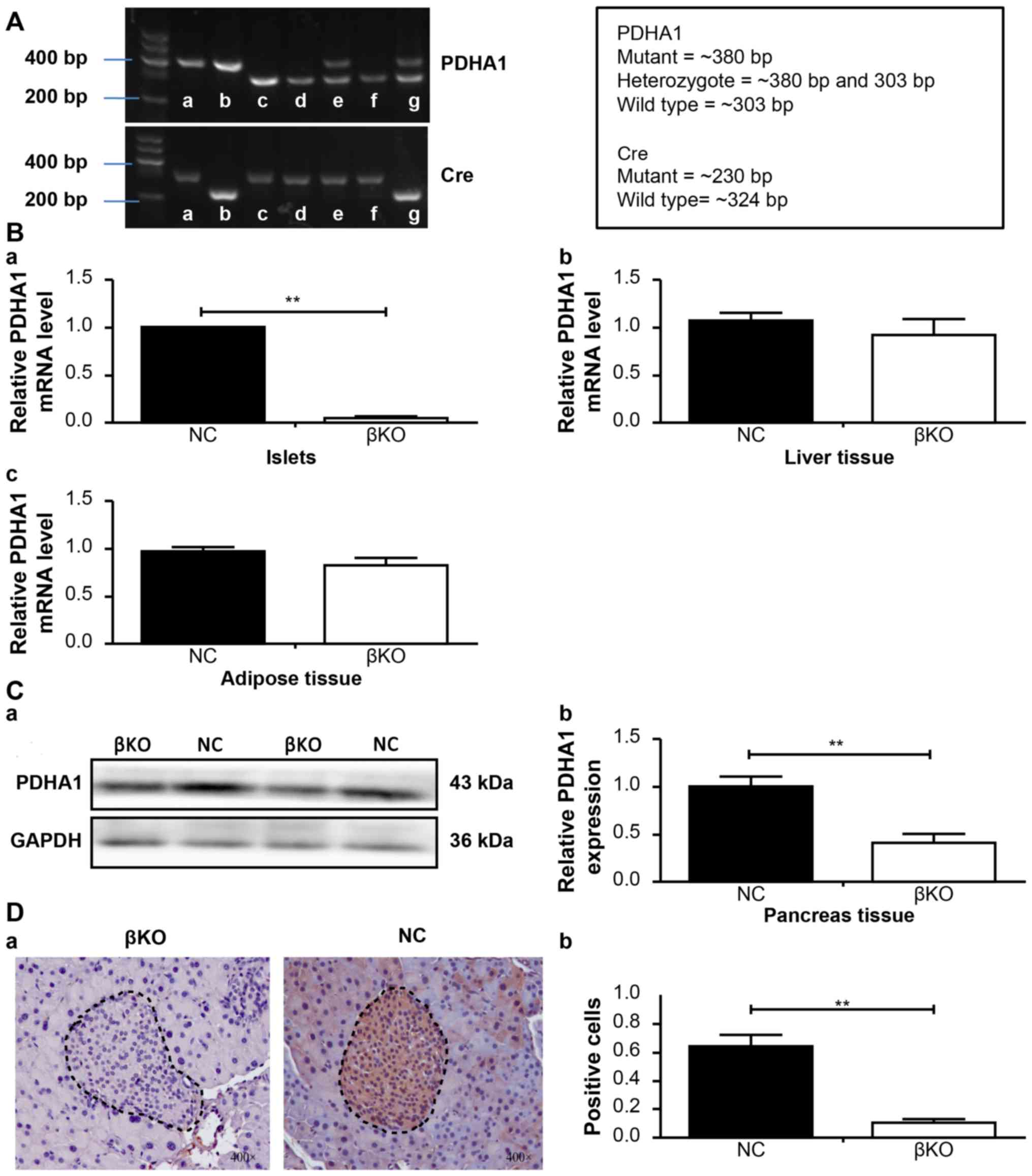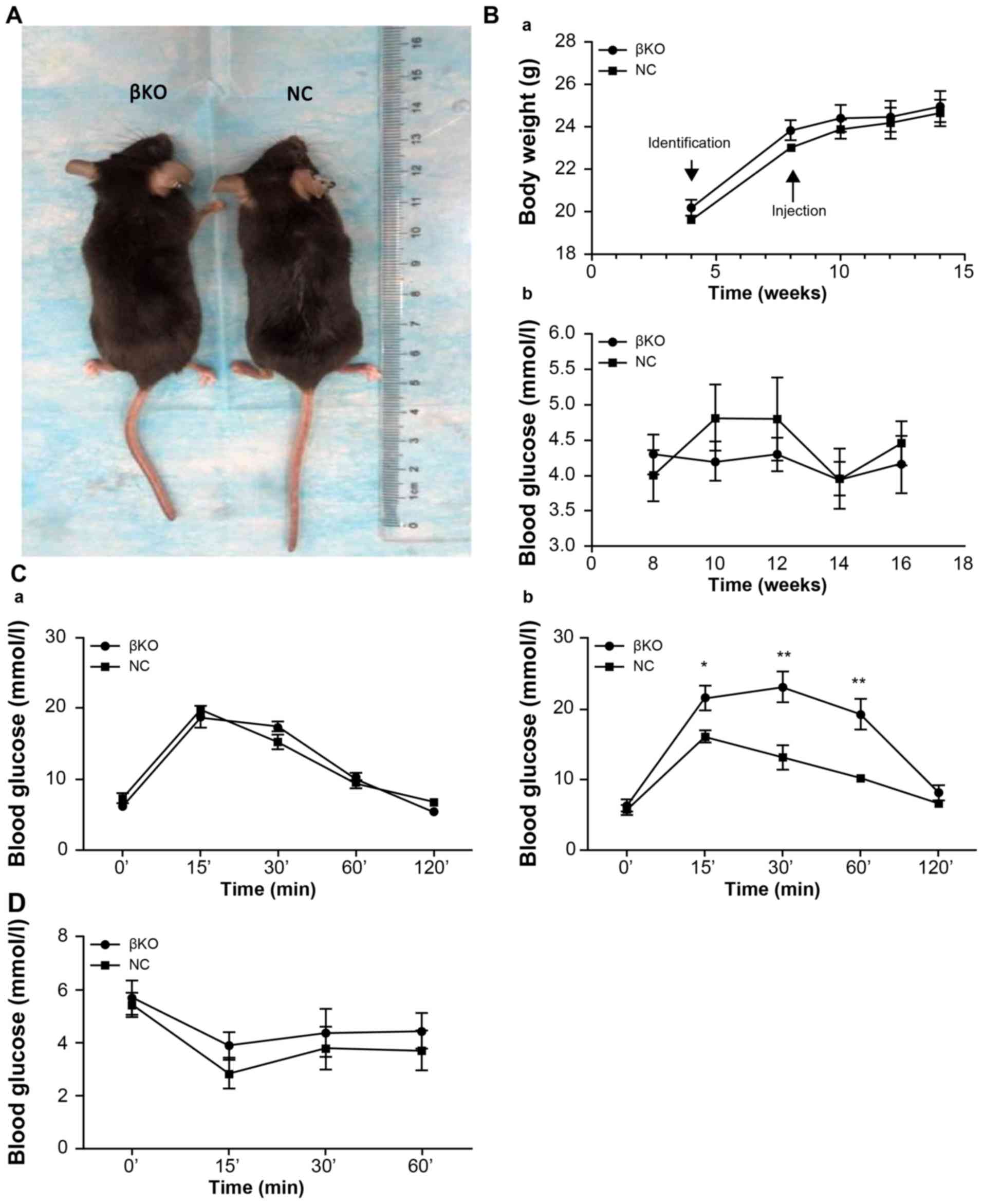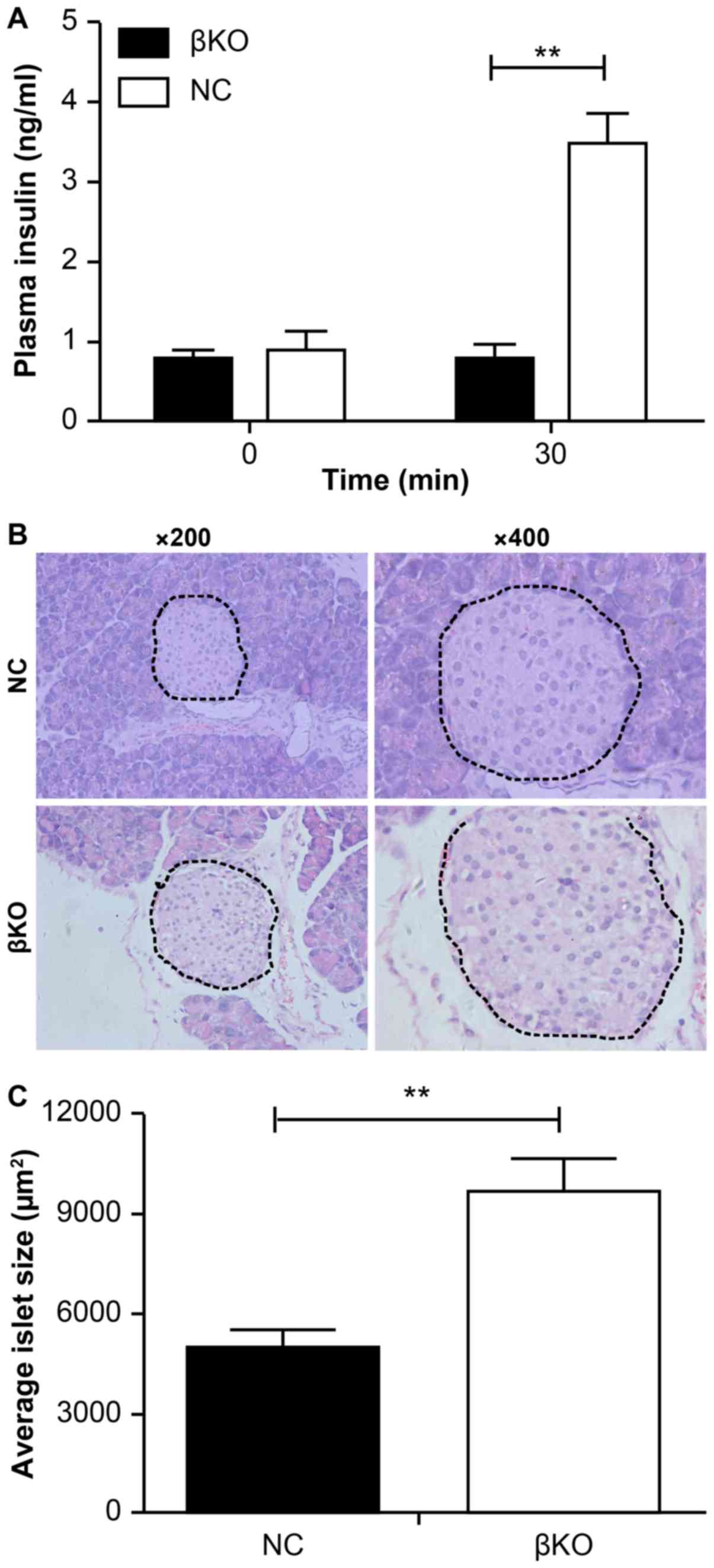|
1
|
Aamodt KI and Powers AC: Signals in the
pancreatic isletmicroenvironment influence β-cell proliferation.
Diabetes Obes Metab. 19 (Suppl 1):S124–S136. 2017. View Article : Google Scholar
|
|
2
|
Seino S, Sugawara K, Yokoi N and Takahashi
H: β-Cell signalling and insulin secretagogues: A path for improved
diabetes therapy. Diabetes Obes Metab. 19 (Suppl 1):S22–S29. 2017.
View Article : Google Scholar
|
|
3
|
Perry RJ, Zhang D, Zhang XM, Boyer JL and
Shulman GI: Controlled-release mitochondrial protonophore reverses
diabetes and steatohepatitis in rats. Science. 347:1253–1256. 2015.
View Article : Google Scholar : PubMed/NCBI
|
|
4
|
Rovira-Llopis S, Bañuls C, Diaz-Morales N,
Hernandez-Mijares A, Rocha M and Victor VM: Mitochondrial dynamics
in type 2 diabetes: Pathophysiological implications. Redox Biol.
11:637–645. 2017. View Article : Google Scholar : PubMed/NCBI
|
|
5
|
Kaufman BA, Li C and Soleimanpour SA:
Mitochondrial regulation of β-cell function: Maintaining the
momentum for insulin release. Mol Aspects Med. 42:91–104. 2015.
View Article : Google Scholar : PubMed/NCBI
|
|
6
|
Morrow RM, Picard M, Derbeneva O, Leipzig
J, McManus MJ, Gouspillou G, Barbat-Artigas S, Dos Santos C, Hepple
RT, Murdock DG and Wallace DC: Mitochondrial energy deficiency
leads to hyperproliferation of skeletal muscle mitochondria and
enhanced insulin sensitivity. Proc Natl Acad Sci USA.
114:2705–2710. 2017. View Article : Google Scholar : PubMed/NCBI
|
|
7
|
Wang H, Lu J, Dolezal J, Kulkarni S, Zhang
W, Chen A, Gorka J, Mandel JA and Prochownik EV: Inhibition of
hepatocellular carcinoma by metabolic normalization. PLoS One.
14:e02181862019. View Article : Google Scholar : PubMed/NCBI
|
|
8
|
Aleem S, Iqbal R, Shar T, Noreen S, Rafiq
N, Javed I, Kosar S, Majeed HN, Sattar NA and Abid MK:
Complications of Diabetes: An insight into genetic polymorphism and
role of insulin. Recent Pat Inflamm Allergy Drug Discov. 12:78–86.
2018. View Article : Google Scholar : PubMed/NCBI
|
|
9
|
Bulthuis EP, Adjobo-Hermans MJW, Willems
PHGM and Koopman WJH: Mitochondrial morphofunction in mammalian
cells. Antioxid Redox Signal. 30:2066–2109. 2019. View Article : Google Scholar : PubMed/NCBI
|
|
10
|
Liu YQ, Jetton TL and Leahy JL: Beta-cell
adaptation to insulin resistance. Increased pyruvate carboxylase
and malate-pyruvate shuttle activity in islets of nondiabetic
Zucker fatty rats. J Biol Chem. 277:39163–39168. 2002. View Article : Google Scholar : PubMed/NCBI
|
|
11
|
Srinivasan S, Guha M, Kashina A and
Avadhani NG: Mitochondrial dysfunction and mitochondrial
dynamics-The cancer connection. Biochim Biophys Acta Bioenerg.
1858:602–614. 2017. View Article : Google Scholar : PubMed/NCBI
|
|
12
|
Mulder H: Transcribing β-cell mitochondria
in health and disease. Mol Metab. 6:1040–1051. 2017. View Article : Google Scholar : PubMed/NCBI
|
|
13
|
Marchetti P, Bugliani M, De Tata V,
Suleiman M and Marselli L: Pancreatic Beta cell identity in humans
and the role of Type 2 diabetes. Front Cell Dev Biol. 5:552017.
View Article : Google Scholar : PubMed/NCBI
|
|
14
|
Ciccarone F, Vegliante R, Di Leo L and
Ciriolo MR: The TCA cycle as a bridge between oncometabolism and
DNA transactions in cancer. Semin Cancer Biol. 47:50–56. 2017.
View Article : Google Scholar : PubMed/NCBI
|
|
15
|
Williams M and Caino MC: Mitochondrial
dynamics in type 2 diabetes and cancer. Front Endocrinol
(Lausanne). 9:2112018. View Article : Google Scholar : PubMed/NCBI
|
|
16
|
Adeva M, González-Lucán M, Seco M and
Donapetry C: Enzymes involved in l-lactate metabolism in humans.
Mitochondrion. 13:615–629. 2013. View Article : Google Scholar : PubMed/NCBI
|
|
17
|
Wijenayake S, Tessier SN and Storey KB:
Regulation of pyruvate dehydrogenase (PDH) in the hibernating
ground squirrel, (Ictidomys tridecemlineatus). J Therm Biol.
69:199–205. 2017. View Article : Google Scholar : PubMed/NCBI
|
|
18
|
Arumugam R, Horowitz E, Noland RC, Lu DH,
Fleenor D and Freemark M: Regulation of islet β-cell pyruvate
metabolism: interactions of prolactin, glucose, and dexamethasone.
Endocrinology. 151:3074–3083. 2010. View Article : Google Scholar : PubMed/NCBI
|
|
19
|
Xu J, Han J, Epstein PN and Liu YQ:
Regulation of PDK mRNA by high fatty acid and glucose in pancreatic
islets. Biochem Biophys Res Commun. 344:827–833. 2006. View Article : Google Scholar : PubMed/NCBI
|
|
20
|
Kono M, Yoshida N, Maeda K, Skinner NE,
Pan W, Kyttaris VC, Tsokos MG and Tsokos GC: Pyruvate dehydrogenase
phosphatase catalytic subunit 2 limits Th17 differentiation. Proc
Natl Acad Sci USA. 115:9288–9293. 2018. View Article : Google Scholar : PubMed/NCBI
|
|
21
|
Jeoung NH: Pyruvate dehydrogenase kinases:
Therapeutic targets for diabetes and cancers. Diabetes Metab J.
39:188–197. 2015. View Article : Google Scholar : PubMed/NCBI
|
|
22
|
Zhang S, Hulver MW, McMillan RP, Cline MA
and Gilbert ER: The pivotal role of pyruvate dehydrogenase kinases
in metabolic flexibility. Nutr Metab (Lond). 11:102014. View Article : Google Scholar : PubMed/NCBI
|
|
23
|
Krus U, Kotova O, Spégel P, Hallgard E,
Sharoyko VV, Vedin A, Moritz T, Sugden MC, Koeck T and Mulder H:
Pyruvate dehydrogenase kinase 1 controls mitochondrial metabolism
and insulin secretion in INS-1 832/13 clonal beta-cells. Biochem J.
429:205–213. 2010. View Article : Google Scholar : PubMed/NCBI
|
|
24
|
Tso SC, Lou M, Wu CY, Gui WJ, Chuang JL,
Morlock LK, Williams NS, Wynn RM, Qi X and Chuang DT: Development
of dihydroxyphenyl sulfonylisoindoline derivatives as
liver-targeting pyruvate dehydrogenase kinase inhibitors. J Med
Chem. 60:1142–1150. 2017. View Article : Google Scholar : PubMed/NCBI
|
|
25
|
Hanson BJ, Capaldi RA, Marusich MF and
Sherwood SW: An immunocytochemical approach to detection of
mitochondrial disorders. J Histochem Cytochem. 50:1281–1288. 2002.
View Article : Google Scholar : PubMed/NCBI
|
|
26
|
Gopal K, Almutairi M, Al Batran R, Eaton
F, Gandhi M and Ussher JR: Cardiac-specific deletion of pyruvate
dehydrogenase impairs glucose oxidation rates and induces diastolic
dysfunction. Front Cardiovasc Med. 5:172018. View Article : Google Scholar : PubMed/NCBI
|
|
27
|
Sidhu S, Gangasani A, Korotchkina LG,
Suzuki G, Fallavollita JA, Canty JM Jr and Patel MS:
Tissue-specific pyruvate dehydrogenase complex deficiency causes
cardiac hypertrophy and sudden death of weaned male mice. Am J
Physiol Heart Circ Physiol. 295:H946–H952. 2008. View Article : Google Scholar : PubMed/NCBI
|
|
28
|
Wu CY, Tso SC, Chuang JL, Gui WJ, Lou M,
Sharma G, Khemtong C, Qi X, Wynn RM and Chuang DT: Targeting
hepatic pyruvate dehydrogenase kinases restores insulin signaling
and mitigates ChREBP-mediated lipogenesis in diet-induced obese
mice. Mol Metab. 12:12–24. 2018. View Article : Google Scholar : PubMed/NCBI
|
|
29
|
Small L, Brandon AE, Quek LE, Krycer JR,
James DE, Turner N and Cooney GJ: Acute activation of pyruvate
dehydrogenase increases glucose oxidation in muscle without
changing glucose uptake. Am J Physiol Endocrinol Metab.
315:E258–E266. 2018. View Article : Google Scholar : PubMed/NCBI
|
|
30
|
Perry RJ, Samuel VT, Petersen KF and
Shulman GI: The role of hepatic lipids in hepatic insulin
resistance and type 2 diabetes. Nature. 510:84–91. 2014. View Article : Google Scholar : PubMed/NCBI
|
|
31
|
Gudiksen A, Bertholdt L, Stankiewicz T,
Tybirk J, Plomgaard P, Bangsbo J and Pilegaard H: Effects of
training status on PDH regulation in human skeletal muscle during
exercise. Pflugers Arch. 469:1615–1630. 2017. View Article : Google Scholar : PubMed/NCBI
|
|
32
|
Zhou YP, Priestman DA, Randle PJ and Grill
VE: Fasting and decreased B cell sensitivity: Important role for
fatty acid-induced inhibition of PDH activity. Am J Physiol.
270:E988–E994. 1996.PubMed/NCBI
|
|
33
|
Andersson KB, Winer LH, Mørk HK, Molkentin
JD and Jaisser F: Tamoxifen administration routes and dosage for
inducible Cre-mediated gene disruption in mouse hearts. Transgenic
Res. 19:715–725. 2010. View Article : Google Scholar : PubMed/NCBI
|
|
34
|
Valny M, Honsa P, Kirdajova D, Kamenik Z
and Anderova M: Tamoxifen in the mouse brain: Implications for
Fate-Mapping studies using the Tamoxifen-Inducible Cre-loxP system.
Front Cell Neurosci. 10:2432016. View Article : Google Scholar : PubMed/NCBI
|
|
35
|
Livak KJ and Schmittgen TD: Analysis of
relative gene expression data using real-time quantitative PCR and
the 2(-Delta Delta C(T)) method. Methods. 25:402–408. 2001.
View Article : Google Scholar : PubMed/NCBI
|
|
36
|
Grosbellet E, Dumont S, Schuster-Klein C,
Guardiola-Lemaitre B, Pevet P, Criscuolo F and Challet E: Circadian
phenotyping of obese and diabetic db/db mice. Biochimie.
124:198–206. 2016. View Article : Google Scholar : PubMed/NCBI
|
|
37
|
Dugan LL, You YH, Ali SS, Diamond-Stanic
M, Miyamoto S, DeCleves AE, Andreyev A, Quach T, Ly S, Shekhtman G,
et al: AMPK dysregulation promotes diabetes-related reduction of
superoxide and mitochondrial function. J Clin Invest.
123:4888–4899. 2013. View Article : Google Scholar : PubMed/NCBI
|
|
38
|
Miki Y, Tanji K, Mori F, Kakita A,
Takahashi H and Wakabayashi K: Alteration of mitochondrial protein
PDHA1 in Lewy body disease and PARK14. Biochem Biophys Res Commun.
489:439–444. 2017. View Article : Google Scholar : PubMed/NCBI
|
|
39
|
American Diabetes Association: (2)
Classification and diagnosis of diabetes. Diabetes Care. 38
(Suppl):S8–S16. 2015. View Article : Google Scholar :
|
|
40
|
Karaa A and Goldstein A: The spectrum of
clinical presentation, diagnosis, and management of mitochondrial
forms of diabetes. Pediatr Diabetes. 16:1–9. 2015. View Article : Google Scholar : PubMed/NCBI
|
|
41
|
Pastors JG, Warshaw H, Daly A, Franz M and
Kulkarni K: The evidence for the effectiveness of medical nutrition
therapy in diabetes management. Diabetes Care. 25:608–613. 2002.
View Article : Google Scholar : PubMed/NCBI
|
|
42
|
Bugger H and Abel ED: Molecular mechanisms
of diabetic cardiomyopathy. Diabetologia. 57:660–671. 2014.
View Article : Google Scholar : PubMed/NCBI
|
|
43
|
Mayers RM, Leighton B and Kilgour E: PDH
kinase inhibitors: A novel therapy for Type II diabetes? Biochem
Soc Trans. 33:367–370. 2005. View Article : Google Scholar : PubMed/NCBI
|
|
44
|
Liu YQ, Moibi JA and Leahy JL: Chronic
high glucose lowers pyruvate dehydrogenase activity in islets
through enhanced production of long chain acyl-CoA: Prevention of
impaired glucose oxidation by enhanced pyruvate recycling through
the malate-pyruvate shuttle. J Biol Chem. 279:7470–7475. 2004.
View Article : Google Scholar : PubMed/NCBI
|
|
45
|
Park S, Jeon JH, Min BK, Ha CM, Thoudam T,
Park BY and Lee IK: Role of the pyruvate dehydrogenase complex in
metabolic remodeling: Differential pyruvate dehydrogenase complex
functions in metabolism. Diabetes Metab J. 42:270–281. 2018.
View Article : Google Scholar : PubMed/NCBI
|
|
46
|
Liu Z, Yu M, Fei B, Fang X, Ma T and Wang
D: miR-21-5p targets PDHA1 to regulate glycolysis and cancer
progression in gastric cancer. Oncol Rep. 40:2955–2963.
2018.PubMed/NCBI
|
|
47
|
Gray LR, Tompkins SC and Taylor EB:
Regulation of pyruvate metabolism and human disease. Cell Mol Life
Sci. 71:2577–2604. 2014. View Article : Google Scholar : PubMed/NCBI
|
|
48
|
Jitrapakdee S, St Maurice M, Rayment I,
Cleland WW, Wallace JC and Attwood PV: Structure, mechanism and
regulation of pyruvate carboxylase. Biochem J. 413:369–387. 2008.
View Article : Google Scholar : PubMed/NCBI
|
|
49
|
Branda CS and Dymecki SM: Talking about
arevolution: The impact of site-specific recombinases on genetic
analyses in mice. Dev Cell. 6:7–28. 2004. View Article : Google Scholar : PubMed/NCBI
|
|
50
|
Yang F, Liu C, Chen D, Tu M, Xie H, Sun H,
Ge X, Tang L, Li J, Zheng J, et al: CRISPR/Cas9-loxP-mediated gene
editing as a novel site-specific genetic manipulation tool. Mol
Ther Nucleic Acids. 7:378–386. 2017. View Article : Google Scholar : PubMed/NCBI
|
|
51
|
Aguirre AJ, Meyers RM, Weir BA, Vazquez F,
Zhang CZ, Ben-David U, Cook A, Ha G, Harrington WF, Doshi MB, et
al: Genomic copy number dictates a gene-independent cell response
to CRISPR/Cas9 targeting. Cancer Discov. 6:914–929. 2016.
View Article : Google Scholar : PubMed/NCBI
|
|
52
|
Srinivasan M, Choi CS, Ghoshal P, Pliss L,
Pandya JD, Hill D, Cline G and Patel MS: ß-cell-specific pyruvate
dehydrogenase deficiency impairs glucose-stimulated insulin
secretion. Am J Physiol Endocrinol Metab. 299:E910–E917. 2010.
View Article : Google Scholar : PubMed/NCBI
|
|
53
|
Nicholls LI, Ainscow EK and Rutter GA:
Glucose-stimulated insulin secretion does not require activation of
pyruvate dehydrogenase: Impact of adenovirus-mediated
overexpression of PDH kinase and PDH phosphate phosphatase in
pancreatic islets. Biochem Biophys Res Commun. 291:1081–1088. 2002.
View Article : Google Scholar : PubMed/NCBI
|
|
54
|
Xu J, Han J, Long YS, Epstein PN and Liu
YQ: The role of pyruvate carboxylase in insulin secretion and
proliferation in rat pancreatic beta cells. Diabetologia.
51:2022–2030. 2008. View Article : Google Scholar : PubMed/NCBI
|















